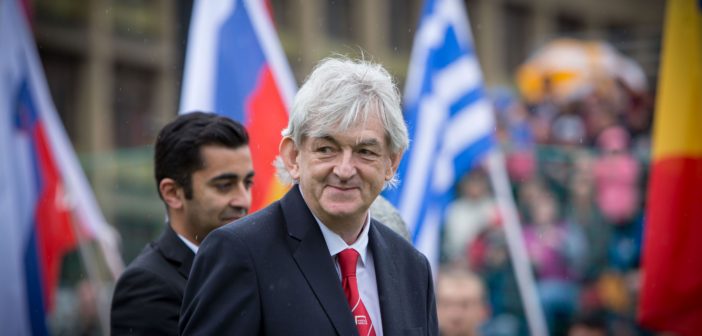It was a strange place to record an interview.
Cardiff University’s fine artificial pitch complete with those pesky black rubber dots was positively shining in the July sunshine. But instead of advertising hoardings at pitch side, two round leather seats like the reception of a Travelodge, had been set facing each other in anticipation.
But I needn’t have worried. There were no formalities and I was soon put at ease.
‘Hi, I’m Mel,’ said the grey haired man in a blue jacket and open necked shirt with a broad smile. Smart casual they call this style. Relaxed but respectable.
He could have been a FIFA or UEFA official on an international charm offensive. But of course he was not. We shook hands and sat down slightly awkwardly on our wobbly seats.
Mel Young was looking forward to this his 17th Homeless World Cup.
Cities now have to bid to host the tournament like every other major footballing event.

Mel Young flanked by Michael Sheen addresses the crowd in Cardiff
Photo: Tim Hartley / Prost Cymru
Mel’s been on a mission for quite some time.
“What Cardiff brought to the table was the potential of a legacy, a new dimension,” he said.
“Of course it’s about the football but we have the addition of a ‘discussion tent’ this year where we’ll be talking all week about how we actually end homelessness.”
He started out in community publishing on a grey housing estate in Edinburgh and describes himself as a social entrepreneur. In 1993 he saw the Big Issue being sold on the streets of London and set up a Scottish version.
Homelessness was as much of a problem then as it is now and soon they were selling 140,000 copies a week. He says the Scottish people never bought into the Conservatives party’s ‘no such thing as society’ mantra.
“I think people bought the Big Issue almost to badge-up, show their defiance,’ he said.”
It was at an international conference for street papers in Cape Town in 2001 that the idea for a Homeless World Cup was born.
“Like all good ideas it started with a chat over a couple of late night beers,” says Mel with a smile on his face.
“Harald Schmied, who ran the street paper in Graz in Austria and I were looking back on the day’s discussions. We were there. The professionals and academics were there.
“But where were the homeless themselves? How could we hear their voice and involve them in their own futures?”
Mel comes from Leith in Edinburgh, is lifelong Hibernian fan and spent his youth on the terraces at Easter Road. He recalled that memorable day in 2016 when the unfancied Hibees beat the mighty Rangers to lift the Scottish FA Cup for the first time.
“That kind of thing sticks with you forever,” he said. “It’s difficult to describe.”
In retrospect the answer to his and Harald’s question as to how to engage with people who are homeless seems obvious. Let’s start with a football game between homeless people in Scotland and Austria, they thought.
“After another round of drinks,” says Mel, “every other country at the conference wanted to come too.”
So in 2003 in Graz was born the Homeless World Cup.

A fan prepares for the game
Photo: Tim Hartley / Prost Cymru
The success of that first tournament was beyond anything they could have imagined. Forget any idea about European dominance of the game. This year’s World Cup, the 17th such event, sees 500 players representing 48 countries from as far afield as Cambodia, Ivory Coast, Pakistan and Brazil taking part
“Never refer to them as “homeless,” Mel admonished me.
“They are first and foremost players. And they are all fantastic ambassadors for their countries. Some of them have gone on to play football professionally. But that’s not the point.”
Mel is keen to see the power of football and the experience the players share at the World Cup being used to engage with them off as much as on the pitch.
He recalls getting on a bus in Edinburgh a few years ago.
“‘Hi Mel,’ said the driver. ‘You don’t remember me do you? I was homeless and then I played football with you guys.’ “
Mel didn’t remember him but here was this guy driving a bus. He had a flat and was engaged. The other passengers were getting impatient while the two chatted away.
“His whole world had changed,” said Mel, “because of football.”
You can hear countless individual stories of change and redemption at this year’s Cup. But Mel is no romantic.
He leaned towards me on the wobbly seat.
“Of course the tournament is a platform for change for the players but we all need to own this issue and address the systematic problems in society,’ he said.”
“Ultimately, we want to make sure the Homeless World Cup doesn’t need to exist.”
More on Homeless World Cup
How football lifts people from their lowest ebb
[VIDEO] Michael Sheen talks exclusively to Prost on the importance of the HWC
‘An amazing experience’ – Football’s Homeless World Cup
‘You’ll be blown away’ – Football’s Homeless World Cup
More than a game – Football’s Homeless World Cup
The Homeless World Cup is a unique, pioneering social movement which uses football to inspire homeless people to change their own lives. Homeless World Cup 2016 is taking place in Glasgow’s George Square from July 10th to July 16th.
For more information, visit www.homelessworldcup.com
![Prost International [PINT]](https://prostinternational.com/wp-content/uploads/2021/08/PINTtFontLogoRoboto1536x78.jpg)



